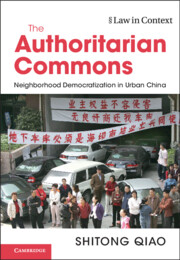Book contents
- The Authoritarian Commons
- Law in Context
- The Authoritarian Commons
- Copyright page
- Dedication
- Contents
- Figures
- Tables
- Acknowledgments
- Abbreviations
- Introduction
- Part I Theory
- Part II A Tale of Three Cities
- Part III Benefits and Risks
- 6 The Origin of Self-governed Communities in Authoritarian Cities
- 7 Neighborhood Governance during China’s COVID Lockdowns
- 8 Contesting Party Leadership
- 9 Associations beyond Neighborhoods and Property
- Conclusion
- Appendix I: Summary of Research Methods
- Appendix II: Survey Data and Analysis
- Notes
- Bibliography
- Index
7 - Neighborhood Governance during China’s COVID Lockdowns
from Part III - Benefits and Risks
Published online by Cambridge University Press: 21 December 2024
- The Authoritarian Commons
- Law in Context
- The Authoritarian Commons
- Copyright page
- Dedication
- Contents
- Figures
- Tables
- Acknowledgments
- Abbreviations
- Introduction
- Part I Theory
- Part II A Tale of Three Cities
- Part III Benefits and Risks
- 6 The Origin of Self-governed Communities in Authoritarian Cities
- 7 Neighborhood Governance during China’s COVID Lockdowns
- 8 Contesting Party Leadership
- 9 Associations beyond Neighborhoods and Property
- Conclusion
- Appendix I: Summary of Research Methods
- Appendix II: Survey Data and Analysis
- Notes
- Bibliography
- Index
Summary
This chapter, the result of extensive fieldwork primarily focusing on Shanghai and Wuhan, where the most significant lockdowns occurred, uncovers the unexamined role of Chinese homeowners and their associations in monitoring and resisting the party-state’s encroachments on individual rights during the COVID pandemic, a phenomenon I term “cooperating to resist.” This chapter demonstrates that the cooperation of Chinese homeowners, which was indispensable to the party-state’s ability to maintain its pandemic control measures, brought them the power to mobilize, resist, and contribute to an abrupt ending of China’s lockdown policy which the party-state’s top leadership had attached its legitimacy to.
Keywords
- Type
- Chapter
- Information
- The Authoritarian CommonsNeighborhood Democratization in Urban China, pp. 99 - 119Publisher: Cambridge University PressPrint publication year: 2025

